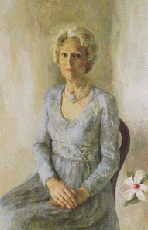

Soon the family moved to California and settled on a small truck farm near Los Angeles--a life of hard work with few luxuries. Her mother, Kate Halberstadt Bender Ryan, died in 1925; at 13 Pat assumed all the household duties for her father and two older brothers. At 18, she lost her father after nursing him through months of illness. Left on her own and determined to continue her education, she worked her way through the University of Southern California. She held part-time jobs on campus, as a sales clerk in a fashionable department store, and as an extra in the movies--and she graduated cum laude in 1937.
She accepted a position as a high-school teacher in Whittier; and there she met Richard Nixon, who had come home from Duke University Law School to establish a practice. They became acquainted at a Little Theater group when they were cast in the same play, and were married on June 21, 1940.
During World War II, she worked as a government economist while he served in the Navy. She campaigned at his side in 1946 when he entered politics, running successfully for Congress, and afterward. Within six years she saw him elected to the House, the Senate, and the Vice Presidency on the ticket with Dwight D. Eisenhower. Despite the demands of official life, the Nixons were devoted parents to their two daughters, Tricia (now Mrs. Edward Cox), and Julie (now Mrs. David Eisenhower).
A tireless campaigner when he ran unsuccessfully for President in 1960, she was at his side when he ran again in 1968--and won. She had once remarked succinctly, "It takes heart to be in political life."
Pat Nixon used her position as First Lady to encourage volunteer service--"the spirit of people helping people." She invited hundreds of families to nondenominational Sunday services in the East Room. She instituted a series of performances by artists in varied American traditions--from opera to bluegrass. Mrs. Nixon took quiet pride in adding 600 paintings and antiques to the White House Collection.
She had shared her husband's journeys abroad in his Vice Presidential years, and she continued the practice during his Presidency. Her travels included the historic visit to the People's Republic of China and the summit meetings in the Soviet Union. Her first solo trip was a journey of compassion to take relief supplies to earthquake victims in Peru. Later she visited Africa and South America with the unique diplomatic standing of Personal Representative of the President. Always she was a charming envoy.
Mrs. Nixon met the troubled days of Watergate with dignity. "I love my husband," she said, "I believe in him, and I am proud of his accomplishments." She died at home in Park Ridge, New Jersey, on June 22, 1993. Her husband followed her in death ten months later. She and the former President are buried at the Richard Nixon Library and Birthplace in Yorba Linda, California


